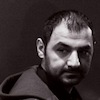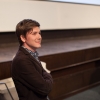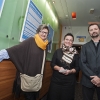
One of the treats of this year’s documentary programme is definitely the Lithuanian film Father, directed by Marat Sargsyan. Father takes us to the world of Vidas Zenonas Antonovas, one of the most interesting criminals of the Soviet Unions, who stole a million roubles from state institutions during his ‘career’ and now lives a quiet family life. We had a chat about the film and its protagonist with director Marat Sargsyan. Father is on program today, at 8PM, at Zagreb Puppet Theater.
- Mr Marat, this is your first documentary. How did you find out the story about Vidas Zenonas Antonovas and what was interesting about his Lithuanian family?
I was searching for the interesting topic for my graduation film. I started filming several different topics in order to find the one story which I could turn into full-blooded film. But none of them were satisfying enough. Once my colleagues told me about Vidas Zenonas Antonovas, this old but incredibly strong man, who spent 20 years in prison, who is a famous criminal, scared of for many years and who‘s got many kids and so on. I thought to myself that this old man is intriguing, it would be very interesting to talk to him, although at that point I wasn‘t thinking yet about his colourful life as a potential material for the film. And again I hear from this other colleague of mine that couple of Vidas‘ children are still very little, one of them is a newborn baby. And here I heard the topic for my film. Suddenly I had a conflict in that palette of colours I was looking for – it raised many questions, the main of which was why does he still need children at the age of 71? What does his own little private kingdom look like from the inside? That‘s how my film has started.
- What was the hardest thing about filming 'Father' and what was the best?
It was my very first serious work in documentary field, so everything was difficult – starting with a script and to the editing the last scene. However, these difficulties are nothing to compare with Vidas‘ wife! From early morning to late evening she would talk to us and we had to think of tricks how to stop the endless conversations. And we did not succeed. She would talk non – stop. Of course, now it’s funny to remember it, but back then it was a disaster. One day, after long time of “suffering”, we found a way which solved this problem in immediately – we asked Vidas to talk to her. The other difficult thing was to get kids to ignore the camera, which took us a while. Also, it was very difficult for us to just watch and not to interfere in their life. It wasn’t easy. It took us around 2 years to film, so I have a lot of memories. One time I was alone, without my camera man Linas. Vidas had to stop by at the police station, so they asked me to take them with my car. Vidas stepped out of the car to go to the police station and I, his wife and their 7 year-old son have left in the car waiting for him to come back. The wife would always sit in the front seat (she was too big for the back seat) and Zenonas, their son, was in the backseat. Vidas‘ wife was killing me with the questions or commenting basically everything she saw. Zenonas was pressing his face to the window, facing the police station. You could hear his fast breathing. Once in a while he‘d ask „When is dad coming back?“ Mom would say „He‘s coming back soon,“ and continue the conversation. I could feel that Zenonas had the question of life and death inside him – WILL his dad come back? He‘s still not back. The window was misty of his breathing. I remembered the film „10 minutes older“ and I felt that Zenonas was growing while waiting for his dad to come back. And dad did come back. Zenonas wasn‘t showing excitement or anything, it was more of a relief. He asked Vidas „Policemen have released you, so you‘re not going to jail?“ On our way back Zenonas fell asleep snuggled with his dad.
- How was it working with Vidas who is carrying the nickname 'The father of mafia'?
I remember the first time I visited Vidas with the proposal to film his family. I knew that people from a criminal world have their own, different understanding about everything. So did the person who spent 20 years in 15 prisons. And one of the main rules in that world is - you have to keep your word (promise). This rule is not strange to me, although I think it‘s the only „charming” thing from that world. I knocked on the door, he opened, and we shook hands. It‘s an old rule – old criminals, especially if they‘re physically strong, they like to squeeze the hand hard while shaking it – I think it‘s a way of testing who‘s in front of them, who are they dealing with. So he squeezed my hand very hard, but I was ready for that and responded respectively. In my opinion, this was the first moment when he accepted me as an equal. We had a conversation, I offered to make a film about him and his family. He said, I trust you, do whatever you want. And we never had any problems with him.
- When we look at Vidas past as the most famous criminal of the Soviet Union who stole around a million roubles from the state’s institutions and hijacked a plane with passengers in order to split for Africa - do you think that the end justify the means?
Vidas‘ past is incredibly interesting, especially when he talks about things that are not in the film. There were wonderful and cruel things in his life. He didn‘t like communists because his dad was a partisan killed by communists. So I guess he had a feeling of revenge inside from when he was a kid. He was stealing from state (communist) institutions, after Soviet Union collapsed – he used to racketeer. I never asked myself if he was right or wrong. I am no judge and just like in the film, I tried to stay an observer. He served 20 years for the crimes he committed. The only thing that really concerned me was if he ever killed a person. Once I turned off the camera and asked him about it. He told me he did a lot of bad things but he never killed anyone. I was looking in his eye when he was saying that and I trust he told me the truth. Later the policemen who lend me some of the archive material told me that as much as they know – he hasn‘t kill anyone. One time Vidas told me he is tired of spending time in jails. When he was little, his dad told him – whatever happens, you must have a family. His grandfather had 18 children and that‘s the biggest example for him. I think right now he‘s trying to fulfil his dreams from when he was young. After long years in prison he now has a family which cannot be called standard – it‘s more like a fortress with their own, kind of wildlife rules.
- What are your future plans and new projects?
My first film was short fiction. The second one – a feature documentary. Right now I am working on a fiction film „The Heritage“, it‘s about Armenian genocide in 1915. However, there will be no violence, the action takes place in a village, in our days. I also have some ideas for documentaries. So we‘ll see.




.jpg)






